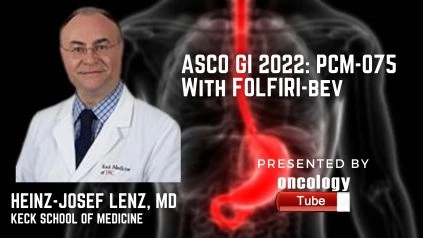Heinz-Josef Lenz, MD, is a professor in the Departments of Medicine and Preventive Medicine in Keck School of Medicine’s oncology division. He is the associate director of clinical research of the USC Norris Comprehensive Cancer Center, is chair of the GI Oncology Program, and is the co-director of the Colorectal Center. He also serves as the scientific director of the Cancer Genetics Unit. In this video, he speaks about the ASCO GI 2022 Abstract – A phase 1b/2 trial of the PLK1 inhibitor onvansertib in combination with FOLFIRI-bev in 2L treatment of KRAS-mutated (mKRAS) metastatic colorectal carcinoma (mCRC).
Â
Origins:
Â
CRC is a prevalent malignancy that accounts for 10% of all cancer incidences and deaths worldwide. Treatment options are limited, and patients with severe illness, particularly those with mKRAS, have a terrible prognosis. Regardless of KRAS mutation status, the ORR for FOLFIRI-bev after failure of 1L therapy for mCRC is 5-13 percent, with PFS 4-6 months and OS 10-12 months. In xenograft models of mKRAS CRC, onvansertib is a highly selective, ATP-competitive, orally accessible PLK1 inhibitor that is synergistic with irinotecan and 5FU. We present preliminary safety, efficacy, and biomarker data from an ongoing Ph1b/2 trial of onvansertib + FOLFIRI-bev in patients with mKRAS mCRC progressing after 1L treatment with fluoropyrimidine + oxaliplatin, +/- bev in patients with mKRAS mCRC progressing after 1L treatment with fluoropyrimidine + oxaliplatin, +/- be
Â
Methodologies:
Â
Patients with mCRC who had a KRAS mutation detected by a CLIA-certified lab were eligible to participate. Onvansertib was given in the Ph1b component of the study in combination with FOLFIRI-bev on a 3+3 dose escalation schedule at 12, 15, or 18 mg/m2 on days 1-5 and 15-19 of each 28-day cycle. The RP2D was chosen because the MTD was 15 mg/m2. The ORR was the Ph2’s primary objective, and radiographic response was measured every 8 weeks according to RECIST v1.1. CTCAE v5.0 was used to track AEs and evaluate safety on a continuous basis. Biomarker analyses were performed on baseline and post-treatment blood samples, including the mutant allele frequency (MAF) of the patient’s known KRAS mutation.
Â
Outcomes:
Â
A total of 50 patients had been treated as of 16 September 2021: 18 on the Ph1b and 32 on the Ph2, including 35 at the RP2D, with a median follow-up of 4.7 months (range 0.4-18). Twenty-six of the fifty patients are still on treatment, as are 24 of the 35 patients with RP2D. The combination was well tolerated; the most common treatment-emergent adverse events (TEAE) were fatigue, neutropenia, and nausea, all of which were mild. Neutropenia was controlled by omitting the 5FU bolus from subsequent FOLFIRI cycles and replacing it with growth factor. 44 of the 50 points were evaluable for efficacy, with 31 of the 35 RP2D points. The entire group had a 36 percent ORR (1CR and 15 PR in 44 points) whereas the RP2D group had a 35 percent ORR (1 CR and 10 PR in 31 pts). The first signs of improvement appeared between 2 and 6 months following the start of treatment. Various KRAS mutations elicited different responses. After the first cycle of medication, patients who achieved a CR or PR had the highest decreases in plasma MAF. Progressing disease (13), toxicity (4), patient decision (4), and continuing to potentially curative surgery or other localized therapy were the causes for 24 of the 50 points being dropped (3).
Â
Findings:
Â
The combination of onvansertib and FOLFIRI-bev was well tolerated, with low-grade TEAEs that were tolerable. In 2L treatment of mCRC patients with diverse KRAS mutations, the combination showed a promising ORR, and efficacy was linked to early alterations in plasma mKRAS. The latest data on safety, efficacy, and biomarkers will be presented. NCT03829410 is the number for the clinical trial.

